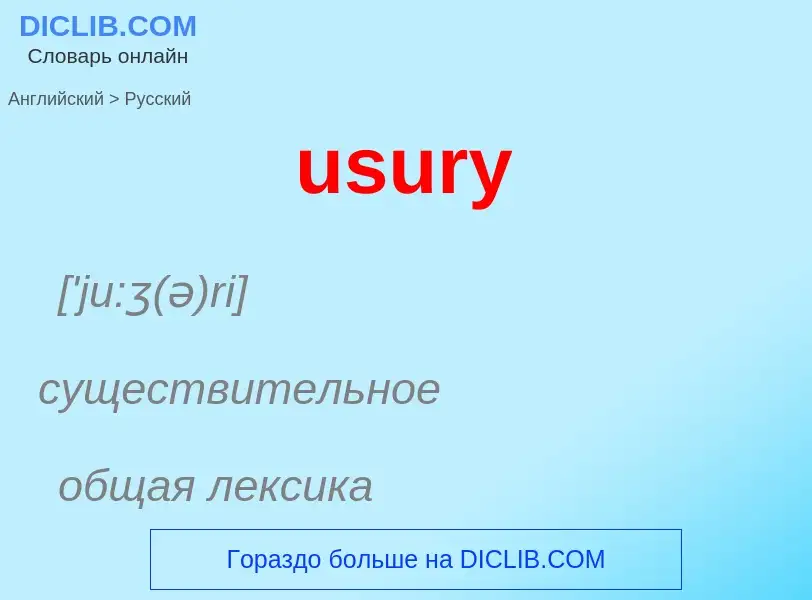Vertaling en analyse van woorden door kunstmatige intelligentie ChatGPT
Op deze pagina kunt u een gedetailleerde analyse krijgen van een woord of zin, geproduceerd met behulp van de beste kunstmatige intelligentietechnologie tot nu toe:
- hoe het woord wordt gebruikt
- gebruiksfrequentie
- het wordt vaker gebruikt in mondelinge of schriftelijke toespraken
- opties voor woordvertaling
- Gebruiksvoorbeelden (meerdere zinnen met vertaling)
- etymologie
usury - vertaling naar russisch
['ju:ʒ(ə)ri]
существительное
общая лексика
ростовщичество
ростовщический процент
излишек
лишек
Definitie
Wikipedia

Usury () is the practice of making unethical or immoral monetary loans that unfairly enrich the lender. The term may be used in a moral sense—condemning taking advantage of others' misfortunes—or in a legal sense, where an interest rate is charged in excess of the maximum rate that is allowed by law. A loan may be considered usurious because of excessive or abusive interest rates or other factors defined by the laws of a state. Someone who practices usury can be called a usurer, but in modern colloquial English may be called a loan shark.
In many historical societies including ancient Christian, Jewish, and Islamic societies, usury meant the charging of interest of any kind, and was considered wrong, or was made illegal. During the Sutra period in India (7th to 2nd centuries BC) there were laws prohibiting the highest castes from practicing usury. Similar condemnations are found in religious texts from Buddhism, Judaism (ribbit in Hebrew), Christianity, and Islam (riba in Arabic). At times, many states from ancient Greece to ancient Rome have outlawed loans with any interest. Though the Roman Empire eventually allowed loans with carefully restricted interest rates, the Catholic Church in medieval Europe, as well as the Reformed Churches, regarded the charging of interest at any rate as sinful (as well as charging a fee for the use of money, such as at a bureau de change). Religious prohibitions on usury are predicated upon the belief that charging interest on a loan is a sin.


![[[St. Bernardino of Siena]], treatise on contracts and usury (''Tractatus de contractis et usuris''), manuscript, 15th century [[St. Bernardino of Siena]], treatise on contracts and usury (''Tractatus de contractis et usuris''), manuscript, 15th century](https://commons.wikimedia.org/wiki/Special:FilePath/Bernardino da Siena – Tractatus de contractis et usuris, 15th-century manuscript – BEIC 10592116.jpg?width=200)

